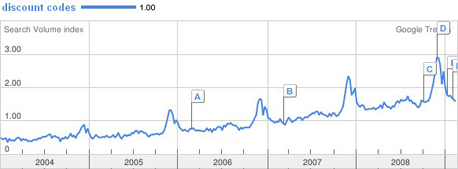Pun most definitely intended! I’ve been faced with a number of queries this week, from clients and members of the team about discount code affiliates, now the IAB have updated their best practice guidelines for discount code sites as well, so I figured I’d get my thoughts down in a blog.
Discount code affiliates make affiliate programmes look good. There’s absolutely no doubt in my mind that discount code affiliates generate an awful lot of revenue for a lot of merchants.
As consumers are becoming cleverer and in particular more and more web savvy, searches for discount codes online have gone through the roof:

With all these smart consumers out there looking for a bargain, discount code sites seem like a great place to promote your product offering. In fact, what possible reason could there be to cut out these hundreds of thousands of shoppers each month?
The main problem for me is cannibalisation of sales. I know this happens… I’ve done it, and I would imagine that most people who are reading this post have done it as well.
What does cannibalisation of sales mean?
I’ve found the product I want to buy, done the research and found the cheapest/best site to get it from. I add the product to the basket and head to the checkout. At which point I’m presented with a box that says “Do you have a promotional code? Enter it below”, I open a new tab, head back to Google, and search for a code that will work for the site.
In the process of finding a code, I’ve been cookied by the discount code affiliate, who will now take credit for that sale. I’m not complaining, I got my basket cheaper, or with free delivery, but as a merchant you’ve got to ask… At what point did that affiliate add value to my business?
The answer is, they didn’t. They stole the last click on a transaction that would have happened with or without their input, and you had to pay them a commission for the privilege. Not only that, but the chances are you’ve given a nice discount on the basket as well, taking another chunk off your profit margin.
But it’s not all bad news
Don’t get me wrong, not all transactions happen like this. Discount code affiliates do have an impact on some users’ decisions and if the discount they provide makes you even a little bit cheaper then the sales will come to you instead of the competition.
They also have huge user bases with:
- Over-active forums of deal hunters that are constantly looking for a good deal
- Huge email lists that not only receive “codes of the week” and other offers, but act on them as well
I honestly think you’d be daft to ban them from a programme all together. They really are a sales force to be reckoned with. I’m not just talking about volumes of people, but the communities and potential brand champions that you’d be missing out on…
- My top tip here is to make sure they work out to be cost effective.
Tighten up your policies and rules
If you know that half of your sales from discount code affiliates are cannibalised from other channels (or even other affiliates!), then do something about it. Reduce their commission rates, or reduce the discount that the codes are giving on your products. Don’t just leave it and pretend that it isn’t happening…you will lose out in the long run.
Imagine the situation – a user has already clicked around to find the product that suits their need, they may have already read a sales pitch from a content affiliate, clicked on a search ad, found you on a price comparison site, read an email, and seen a banner. Then the user comes to your site, adds the product to their basket and goes to checkout, finds a code, and makes the purchase… Is it fair that the discount code affiliate then gets all the commission for that sale? I’ll let you decide…
